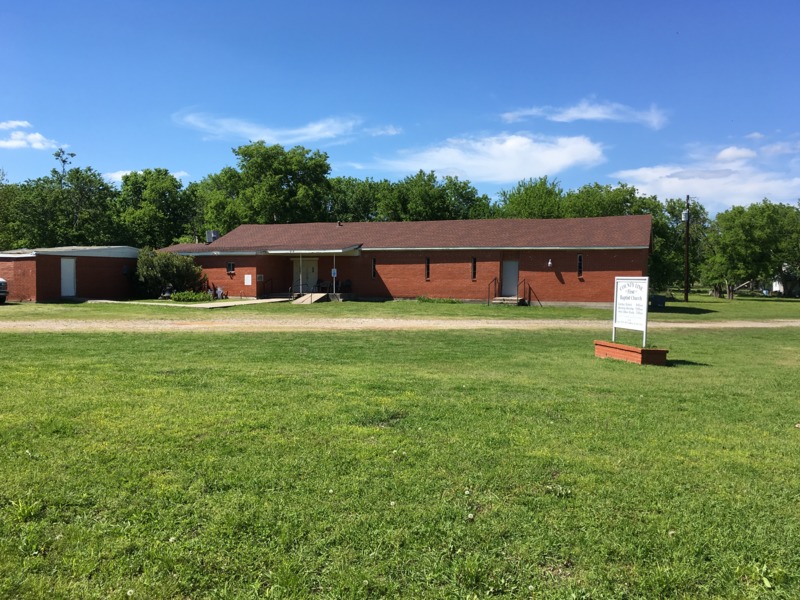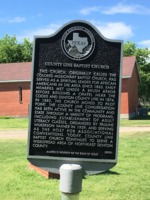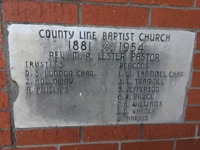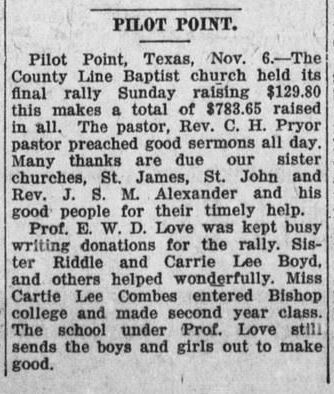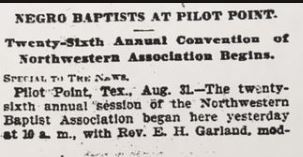County Line Baptist Church
COUNTY LINE BAPTIST CHURCH. County Line Baptist Church, formally the Colored Missionary Baptist Church, was organized in 1863 by former slaves around the northern edge of Denton County and the southern edge of Cooke County. Before the first church building was erected, the congregation met in a brush harbor, where many African American churches held their services, before they could build a church of their own. Lewis Whitlow, a former slave from Chambers County, Alabama led the efforts to construct the first church in 1874 and led other former slaves of Chambers County to Pilot Point, TX.
According to Whitlow family oral history, following emancipation, Louis Whitlow’s owner, who was the owner of the Whitlow Plantation in Chambers County, Alabama, assisted Louis and other former slaves find a new place to settle. Texas became the chosen destination and they decided to settle north of Pilot Point due to the close proximity of the railroad. This railroad is said to have traveled through Sherman, Denison, and Denton County, which could of been the Texas & Pacific Railroad, which went through all three of those locations, including Pilot Point.
County Line also served as school to teach former slaves how to read and write. According to Whitlow family oral history, Louis Whitlow, himself recruited an African American teacher from Alabama to teach the former slaves. Other than Whitlow oral history, there is little documentation of the early history of the church before 1930. However, local newspaper articles from Denton County and surrounding counties reported on County Line church activities during the late nineteenth and early twentieth centuries.
County Line was a member of the Northwestern Baptist Association that convened annually, and hosted the twenty-sixth annual conference in 1900. According to the Dallas Morning News, ministers from across North Texas attended the conference, including guests from out-of-state. County Line also interacted with other African American churches in Denton County and the North Texas region through church conferences. One of the most discussed topics at the conferences concerned education and the African American youth.
According to a Dallas Express article from 1919, County Line Baptist, St. John’s Baptist, and St. James Baptist were sister churches. The sister churches of County Line often participated in church-led recreational activities together, and sometimes with African American churches in Denton. After St. John’s Baptist dissolved around the 1920s or 1930s, many members of the St. John’s congregation began attending County Line. According to Mary Jackson, a member of the County Line congregation, many descendents of St. John’s congregation still attend County Line. Ms. Jackson herself is one of those descendants, of the Whitlows and Allens.
Several known ministers preached at County Line between the 1870s and 1930s, including: W.C. Cobbs, C.H. Pryor, C.C. Trimble, William Haze Varner, and W.N. Walker. A few of the preachers were visiting preachers that probably rotated between other African American baptist churches in the area. Other preachers also had other jobs besides preaching such as C.C. Trimble who also taught at the African American school in Pilot Point during the early twentieth century. William Haze Varner’s occupation is also listed as “farmer” in the 1880 census. Furthermore, African American ministers were figureheads in their community and often served as intermediaries between their community and the surrounding white communities.
By 1939, County Line Baptist served as school for the African American community again. Pauline Wilkerson, the wife of Rev. Varner organized an adult school for African American senior citizens who could not read or write. Rev. Varner was a moderator for the Northwestern Baptist Association and for the Baptist Youth People’s Union (BYPU) organization
Citations: Valerie L. Scott, County Line Baptist Church Texas Historical Commission (THC) Subject Marker Application, Denton County, 2007. https://apps.dentoncounty.com/website/historicalmarkers/PDFs/County-Line-Baptist-Church.pdf (accessed April 14, 2018);Scott, County Line Baptist Church, THC, 2007; See map of Texas railroads created 1926, Dodge, Ira D. Railroad map of Texas (Dallas: Ira D. Dodge, 1926). Map. https://www.loc.gov/item/2004629147/ ; “Negro Baptists at Pilot Point: Twenty-Sixth Annual Convention of Northwestern Association Begins,” Dallas Morning News (Dallas, Tex), Vol.15 , No. 335, Ed.1, September 1, 1900, newspaper, Dallas Public Library, Dallas, Texas;THC 2007, says County Line hosted the 15th annual conference, not the 26th annual conference;Articles that discuss church conferences and education for African American youth in North Texas, “Colored Baptist Convention,” Dallas Morning News (Dallas, Tex), Vol.12 , No. 336, Ed.1, September 2, 1897, newspaper, Dallas Public Library, Dallas, Texas; “Negro Baptist Young Peoples Union Holds Its Annual Meeting at Greenville,” Dallas Morning News (Dallas, Tex), Vol.16 , No. 258, Ed.1, June 15, 1901, newspaper, Dallas Public Library, Dallas, Texas; “North Texas Negro Teachers: List of Papers Read At Meeting of Association at Sherman,” Dallas Morning News (Dallas, Tex), Vol.22 , No. 64, Ed.1, December 2, 1906, newspaper, Dallas Public Library, Dallas, Texas;The Dallas Express (Dallas, Tex.), Vol. 27, No. 5, Ed. 1 Saturday, November 8, 1919, newspaper, November 8, 1919; Dallas, Texas. (texashistory.unt.edu/ark:/67531/metapth278285/m1/9/?q=pilot+point: accessed, University of North Texas Libraries, The Portal to Texas History, texashistory.unt.edu;Ibid;Mary Jackson, phone call to Sarah Cunningham, April 3, 2018;Ibid;The names of the preachers were extracted from the Dallas Express “Texas Towns” articles of Denton and Pilot Point from 1919-1924, https://texashistory.unt.edu/search/?fq=str_title_serial:The+Dallas+Express&fq=untl_decade:1910-1919&fq=str_location_county:Dallas+County,+TX&q="Dallas+Express"&start=48&t=fulltext#result-1 ;Ancestry.com. 1920 United States Federal Census [database on-line]. Provo, UT, USA: Ancestry.com Operations, Inc., 2010. Images reproduced by FamilySearch.https://search.ancestry.com/cgi-bin/sse.dll?indiv=1&dbid=2272&h=22555948&tid=&pid=&usePUB=true&_phsrc=fph18&_phstart=successSource;Edward Ayers, Promise of the New South: Life After Reconstruction (New York: Oxford University Press, 2007), 164; Leon Liwack, Trouble in Mind: Black Southerners in the Age of Jim Crow (New York: Knopf, 1998), 355; Scott, County Line Baptist Church, THC, 2007
